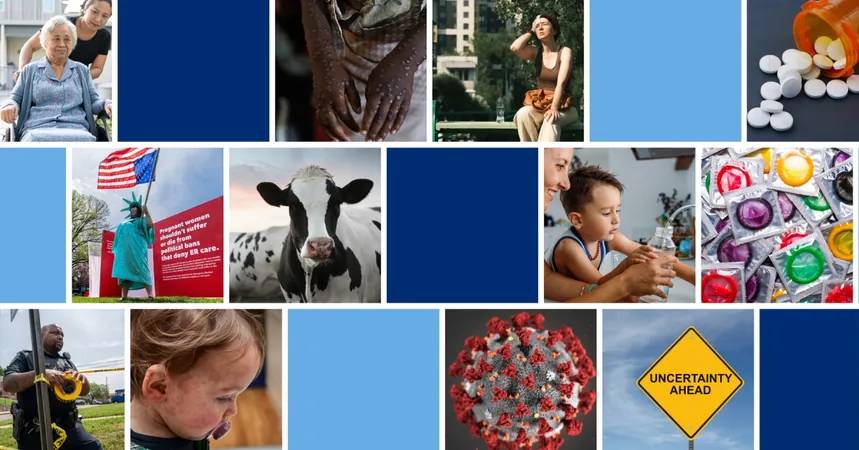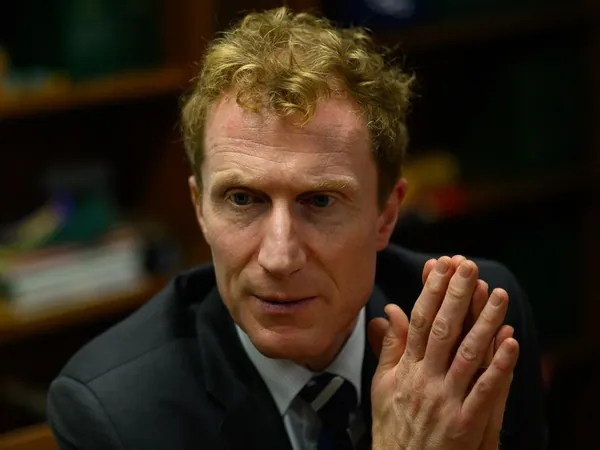
The 2024 Rollercoaster: Key Public Health Events You Can't Miss!
2024-12-18
Author: Jacques
COVID-19 and Seasonal Flu: A Persistent Threat
Experts had warned that 2024 would be a worrisome year for viral infections, and predictions came true with rising cases of both COVID-19 and flu. Recent data from the CDC indicates that the flu season of 2023-2024 has led to an uptick in illnesses and fatalities, particularly alarming among children, with pediatric deaths surpassing previous non-pandemic years.
Adding fuel to the fire, the CDC updated its COVID-19 isolation guidelines just in time for the emergence of new variants. The latest vaccines from Moderna, Pfizer, and Novavax became available, yet uptake has unfortunately lagged, echoing concerns from earlier vaccination campaigns.
Avian Influenza Takes Flight Again
H5N1, the avian influenza virus known for its impact on birds, made headlines after being detected in cows. The alarming spread has been confirmed on nearly 861 dairy farms, with human cases now reaching over 50 in the U.S. The cross-species transmission raises serious concerns, yet experts report that there is currently no significant person-to-person transmission, a relief amid the rising tensions.
Abortion Bans and Their Ripple Effects on Women's Health
The repercussions of the 2022 Dobbs decision have rippled through the healthcare system, affecting access to reproductive services and exacerbating existing healthcare disparities. Studies show significant rises in mental health issues among women in states that enacted abortion bans, and data from Texas highlights an unsettling increase in infant mortality rates following its early pregnancy ban. This underlines a pressing need for renewed focus on women's health in the aftermath of controversial legislation.
A Surge in Vaccine-Preventable Diseases
The global landscape of infectious diseases shifted dramatically this year, with the World Health Organization reporting measles outbreaks in every region. In the U.S., investigators announced 16 outbreaks—the highest in a decade—directly linked to plummeting vaccination rates, influenced by the anti-vaccination movement. Pertussis, or whooping cough, also made a noteworthy comeback, with an alarming sixfold increase in cases reported compared to last year.
Mpox Outbreak Raises Concerns Globally
In an unexpected twist, the WHO declared mpox outbreaks a public health emergency, particularly in Central Africa. The spread of this contagious virus has raised alarms, with cases reported in Europe, heightening fears of it crossing into the U.S. The vaccination efforts for mpox are underway but highlight the unpredictable nature of emerging infectious diseases.
Gun Violence: A Public Health Crisis
This year, firearm violence was officially recognized as a public health crisis by U.S. Surgeon General Vivek Murthy. Tragically, guns became the leading cause of death for children and teens. The historic manslaughter convictions of the parents of a school shooter marked a pivotal moment in addressing accountability for gun safety.
A Shift in Overdose Deaths and STIs
Amidst rising concerns, data from the CDC indicated a nearly 17% decrease in drug overdose deaths, attributed to better access to treatments like naloxone and increased addiction support. The STI epidemic also saw encouraging declines, with figures returning to pre-pandemic levels for some infections—hinting at a possible change in public health behavior.
EPA Takes Action on Toxic Chemicals
In a significant policy shift, the EPA mandated significant reductions in "forever chemicals," known as PFAS, in water supplies. Growing evidence highlights their adverse health effects, pushing for deeper research and more robust environmental protections in the face of ongoing climate challenges.
Extreme Weather and Public Health
Communities worldwide grappled with the severe impacts of climate change, including extreme heat waves and devastating hurricanes. Experts advocate for urgent action and a global commitment to sustainable solutions to protect our planet and public health for future generations.
Declining Life Expectancy: A Call to Action
A striking report revealed a 2.7-year life expectancy gap between the U.S. and countries like England and Wales, driven by chronic health issues, gun violence, and addiction. Public health leaders advocate for evidence-based policies to mitigate this shameful disparity and improve health outcomes across the state.
Looking to the Future: 2025 and Beyond
As we head towards 2025, critical questions loom: What public health priorities should states focus on? How will national election outcomes influence healthcare policies? The public health sphere remains in flux, but dedicated professionals are committed to addressing both immediate and long-term challenges ahead.
In this evolving narrative, keeping our eyes open and informed is essential. Together, we can navigate the complexities of public health and work toward a healthier future for all.









 Brasil (PT)
Brasil (PT)
 Canada (EN)
Canada (EN)
 Chile (ES)
Chile (ES)
 España (ES)
España (ES)
 France (FR)
France (FR)
 Hong Kong (EN)
Hong Kong (EN)
 Italia (IT)
Italia (IT)
 日本 (JA)
日本 (JA)
 Magyarország (HU)
Magyarország (HU)
 Norge (NO)
Norge (NO)
 Polska (PL)
Polska (PL)
 Schweiz (DE)
Schweiz (DE)
 Singapore (EN)
Singapore (EN)
 Sverige (SV)
Sverige (SV)
 Suomi (FI)
Suomi (FI)
 Türkiye (TR)
Türkiye (TR)